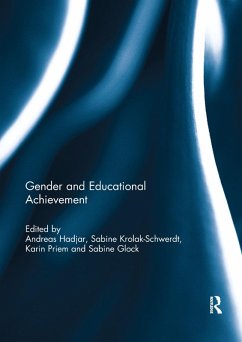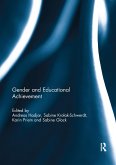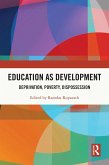Gender and Educational Achievement (eBook, ePUB)
Redaktion: Hadjar, Andreas; Glock, Sabine; Priem, Karin; Krolak-Schwerdt, Sabine
30,95 €
30,95 €
inkl. MwSt.
Sofort per Download lieferbar

15 °P sammeln
30,95 €
Als Download kaufen

30,95 €
inkl. MwSt.
Sofort per Download lieferbar

15 °P sammeln
Jetzt verschenken
Alle Infos zum eBook verschenken
30,95 €
inkl. MwSt.
Sofort per Download lieferbar
Alle Infos zum eBook verschenken

15 °P sammeln
Gender and Educational Achievement (eBook, ePUB)
Redaktion: Hadjar, Andreas; Glock, Sabine; Priem, Karin; Krolak-Schwerdt, Sabine
- Format: ePub
- Merkliste
- Auf die Merkliste
- Bewerten Bewerten
- Teilen
- Produkt teilen
- Produkterinnerung
- Produkterinnerung

Bitte loggen Sie sich zunächst in Ihr Kundenkonto ein oder registrieren Sie sich bei
bücher.de, um das eBook-Abo tolino select nutzen zu können.
Hier können Sie sich einloggen
Hier können Sie sich einloggen
Sie sind bereits eingeloggt. Klicken Sie auf 2. tolino select Abo, um fortzufahren.

Bitte loggen Sie sich zunächst in Ihr Kundenkonto ein oder registrieren Sie sich bei bücher.de, um das eBook-Abo tolino select nutzen zu können.
Gender inequalities in education have tremendously changed over the course of the 20th century, particularly in upper secondary education. Historically, female participation in upper secondary general education, and women's chances to successfully finish this educational pathway, have been lower than men's.
- Geräte: eReader
- mit Kopierschutz
- eBook Hilfe
- Größe: 0.86MB
Andere Kunden interessierten sich auch für
![Gender and Educational Achievement (eBook, PDF) Gender and Educational Achievement (eBook, PDF)]() Gender and Educational Achievement (eBook, PDF)30,95 €
Gender and Educational Achievement (eBook, PDF)30,95 €![Contrasting School Culture and Education (eBook, ePUB) Contrasting School Culture and Education (eBook, ePUB)]() V. SucharitaContrasting School Culture and Education (eBook, ePUB)42,95 €
V. SucharitaContrasting School Culture and Education (eBook, ePUB)42,95 €![Revealing the Invisible (eBook, ePUB) Revealing the Invisible (eBook, ePUB)]() Sherry MarxRevealing the Invisible (eBook, ePUB)46,95 €
Sherry MarxRevealing the Invisible (eBook, ePUB)46,95 €![Material Feminisms: New Directions for Education (eBook, ePUB) Material Feminisms: New Directions for Education (eBook, ePUB)]() Material Feminisms: New Directions for Education (eBook, ePUB)45,95 €
Material Feminisms: New Directions for Education (eBook, ePUB)45,95 €![The Problem with Boys' Education (eBook, ePUB) The Problem with Boys' Education (eBook, ePUB)]() The Problem with Boys' Education (eBook, ePUB)30,95 €
The Problem with Boys' Education (eBook, ePUB)30,95 €!['Labour Class' Children's Schooling in Urban India (eBook, ePUB) 'Labour Class' Children's Schooling in Urban India (eBook, ePUB)]() Reva Yunus'Labour Class' Children's Schooling in Urban India (eBook, ePUB)42,95 €
Reva Yunus'Labour Class' Children's Schooling in Urban India (eBook, ePUB)42,95 €![Education as Development (eBook, ePUB) Education as Development (eBook, ePUB)]() Education as Development (eBook, ePUB)42,95 €
Education as Development (eBook, ePUB)42,95 €-
-
-
Gender inequalities in education have tremendously changed over the course of the 20th century, particularly in upper secondary education. Historically, female participation in upper secondary general education, and women's chances to successfully finish this educational pathway, have been lower than men's.
Dieser Download kann aus rechtlichen Gründen nur mit Rechnungsadresse in A, B, BG, CY, CZ, D, DK, EW, E, FIN, F, GR, HR, H, IRL, I, LT, L, LR, M, NL, PL, P, R, S, SLO, SK ausgeliefert werden.
Produktdetails
- Produktdetails
- Verlag: Taylor & Francis eBooks
- Seitenzahl: 156
- Erscheinungstermin: 2. Februar 2018
- Englisch
- ISBN-13: 9781317224075
- Artikelnr.: 54038745
- Verlag: Taylor & Francis eBooks
- Seitenzahl: 156
- Erscheinungstermin: 2. Februar 2018
- Englisch
- ISBN-13: 9781317224075
- Artikelnr.: 54038745
- Herstellerkennzeichnung Die Herstellerinformationen sind derzeit nicht verfügbar.
Andreas Hadjar is Professor in Sociology of Education at the University of Luxembourg. His research interests center on sociology of education, inequalities (class, gender, and ethnicity), political sociology (particularly participation, social values, and attitudes), well-being, methods of empirical research and international comparisons. His research and publications in regard to the issue of gender inequalities in education particularly focus on gender roles, school alienation and peer attitudes towards school. Sabine Krolak-Schwerdt is Professor of Educational Measurement at the University of Luxembourg. Her research topics include statistical and research methods, educational psychology, and social cognition. She is a member of the advisory board of the Journal of Educational Research Online , and an editorial consultant for journals including Psychometrika, the British Journal of Mathematical and Statistical Psychology, the Journal of Classification, and grant agencies including the German Research Foundation, Swiss National Science Foundation and European Science Foundation. Karin Priem is Professor of History of Education at the University of Luxembourg. She has been president of the German History of Education Association (2007-2011), is a member of the international advisory board of the Revue Suisse des Sciences de l¿Éducation, and is Secretary of the International Standing Conference for the History of Education. She is co-editor of two book series and her research focuses on the history of educational theories and concepts, the social, visual and material history of education, and the history of entrepreneurship and education. Sabine Glock is a member of the School of Education at the Bergische Universität Wuppertal, Germany. She studied Psychology and holds a Ph.D. from the University of Saarland, Saarbrücken, Germany. Her research focuses on teachers¿ decision making and how the ethnic background of students influences teachers¿ academic achievement judgments or classroom management strategies. Her main research interest is implicit cognition, in particular implicit teacher attitudes toward ethnic minority students.
Gender Differences in Educational Attainment - An Introduction 1. Females
in science: a contradictory concept? 2. The construction of 'female
citizens': a socio-historical analysis of girls' education in Luxembourg
3. How gender became sex: mapping the gendered effects of sex-group
categorisation onto pedagogy, policy and practice 4. Troubling discourses
on gender and education 5. Reversal of gender differences in educational
attainment: an historical analysis of the West German case 6. The gendered
interplay between success and well-being during transitions 7. How gender
differences in academic engagement relate to students' gender identity 8.
Gender differences in school success: what are the roles of students'
intelligence, personality and motivation? 9. Teacher evaluation of student
ability: what roles do teacher gender, student gender, and their
interaction play?
in science: a contradictory concept? 2. The construction of 'female
citizens': a socio-historical analysis of girls' education in Luxembourg
3. How gender became sex: mapping the gendered effects of sex-group
categorisation onto pedagogy, policy and practice 4. Troubling discourses
on gender and education 5. Reversal of gender differences in educational
attainment: an historical analysis of the West German case 6. The gendered
interplay between success and well-being during transitions 7. How gender
differences in academic engagement relate to students' gender identity 8.
Gender differences in school success: what are the roles of students'
intelligence, personality and motivation? 9. Teacher evaluation of student
ability: what roles do teacher gender, student gender, and their
interaction play?
Gender Differences in Educational Attainment - An Introduction 1. Females
in science: a contradictory concept? 2. The construction of 'female
citizens': a socio-historical analysis of girls' education in Luxembourg
3. How gender became sex: mapping the gendered effects of sex-group
categorisation onto pedagogy, policy and practice 4. Troubling discourses
on gender and education 5. Reversal of gender differences in educational
attainment: an historical analysis of the West German case 6. The gendered
interplay between success and well-being during transitions 7. How gender
differences in academic engagement relate to students' gender identity 8.
Gender differences in school success: what are the roles of students'
intelligence, personality and motivation? 9. Teacher evaluation of student
ability: what roles do teacher gender, student gender, and their
interaction play?
in science: a contradictory concept? 2. The construction of 'female
citizens': a socio-historical analysis of girls' education in Luxembourg
3. How gender became sex: mapping the gendered effects of sex-group
categorisation onto pedagogy, policy and practice 4. Troubling discourses
on gender and education 5. Reversal of gender differences in educational
attainment: an historical analysis of the West German case 6. The gendered
interplay between success and well-being during transitions 7. How gender
differences in academic engagement relate to students' gender identity 8.
Gender differences in school success: what are the roles of students'
intelligence, personality and motivation? 9. Teacher evaluation of student
ability: what roles do teacher gender, student gender, and their
interaction play?







